Payroll in Indonesia entails more than merely transferring wages. It is a complex mechanism governed by strict labor laws and employee peculiarities. From BPJS Kesehatan and BPJS Ketenagakerjaan, PPh 21 tax deductions, THR, to severance pay regulations, companies must ensure that payroll execution is done on time, properly, and legally each month.
2025 will find Indonesian workplaces strengthened by digital transformation, and manual payroll processes are going under extinction. Payroll automation software is now the de facto option used by SMEs, startups, and big corporations to help ease compliance, avert human error, and nurture employee experience. Modern payroll systems do much more than just calculate salaries and taxes; they also tie directly to government portals for issuing digital payslips-supported Bahasa Indonesia interfaces to foster quick adoption of payroll systems across teams.
This blog delves into the workings of payroll software in Indonesia, its various kinds, and lists 7 best payroll software in 2025 that can help keep your business compliant and efficient.
Table of Contents
- Types of Software Payroll Indonesia
- Benefits of Software Payroll Indonesia
- 7 Best Payroll Software Solutions for Indonesian Companies in 2025
- How to Choose the Right Payroll Software in Indonesia
- Future of Payroll Software in Indonesia (2025 and Beyond)
- Streamline Your Payroll Workflow with Asanify’s Localized Solution
- Conclusion
- FAQs
What is Software Payroll Indonesia?
Indonesian payroll software serves to provide automated, integrated, and uninterrupted payroll processes in line with the local laws. Typically, the system is designed for:
- Calculation of salaries such as basic pay, allowance, overtime, and deductions
- Applying deductions according to Indonesian regulations under PPh 21 tax
- Registration and contribution to BPJS for health and employment
- Generation and distribution of payslips, whether digital or printed
- Payroll disbursement through direct payment to employees’ bank accounts
- Employee data management, both collection of e-KTP (national identity card), and NPWP (tax number).
Unlike generic global payroll solutions, Indonesian-based payroll systems are heavily localized: with Bahasa Indonesia dashboards, pre-built statutory templates, and tax-compliance modules operating in an automated fashion. Therefore, they prove to be a boon to companies that have an increasing number of employees without any extensive HR team in place.

Suggested Read: Top 10 Payroll Companies in Pune (2025): A Complete Guide
Types of Software Payroll Indonesia
Payroll is not a commodity. The chosen payroll solution will vary according to the size of the company, compliance necessities, budget, and digital maturity. Let’s now examine the different categories of payroll software in Indonesia:.
Cloud-Based Payroll Software
These SaaS payroll software tools are cloud applications for people in HR, who require real-time access from anywhere. As such, the cloud payroll system is automatically updated in accordance with the newest tax and BPJS laws, hence promoting easier compliance. Cloud solutions are low-priced, scalable, and excellent for SMEs or hybrid teams that desire flexibility without building an expensive IT backbone.
On-Premise Payroll Software
Installed on company servers, the on-premise payroll system offers more control and data security. Mainly used by large companies or regulated industries (banking, manufacturing, etc.), they come with a heavy upfront investment for installation, IT maintenance, and manual updating to conform to ever-changing labor laws.
HR and Payroll Integrated Software
These platforms include HR functions such as onboarding, attendance tracking, and leave management alongside payroll processing. The integration of HR and payroll into a single system means that businesses can avoid double data entry, streamlining employees.
Payroll Software with Outsourcing Services
There are some providers that provide a hybrid solution in which organizations run payroll software but also outsource payroll processing to the provider. This works well for organizations that want transparency into payroll but are willing to leave compliance-heavy calculations and disbursement activity to experts.
Enterprise Payroll Solutions
Multi-entity large firms with complex pay systems and varied contracts necessitate sophisticated payroll platforms. Enterprise payroll software, most often, directly interfaces with government systems, provides extensive analytics, and guarantees smooth compliance in multiple locations.
Benefits of Software Payroll Indonesia
Payroll software installation in Indonesia is not merely to save time—it’s to comply, be accurate, and enjoy employee confidence in a nation where payroll laws are incredibly intricate. Below are the most important advantages:
- Decreasing compliance risk (PPh 21, BPJS, THR, PHK): Payroll systems determine statutory requirements such as income tax (PPh 21), BPJS payments, religious holiday bonus (THR), and layoff compensation (PHK), reducing the risk of fines.
- Monthly salary processing and reporting automation: Repeated payroll cycles are simplified with automatic calculation of salaries, deductions, and overtime, and pre-filled tax and BPJS reports.
- Reducing manual errors: With systemized processes replacing spreadsheets, companies eliminate expensive errors that affect compliance and employee satisfaction.
- Enhancing employee satisfaction through self-service portals: Employees can view payslips, tax documents, and leave balances at any time, without subjecting them to HR intervention.
- Rapidly accelerating payroll cycles: What could be done in days can now be performed in hours with the help of automation and bank integrations for salary payment.
- Integration with other systems such as accounting and HRIS: Most payroll software integrates easily with HR, accounting, and ERP systems, and offers a single source of truth.
- Enabling mobile-first workflows: Given Indonesia’s extremely mobile population, mobile apps for payroll provide ease for employees to access payslips, make amendments to data, or follow leave on smartphones.
7 Best Payroll Software Solutions for Indonesian Companies in 2025
Here are the best payroll solutions assisting companies in Indonesia to handle salaries, compliance, and HR better in 2025:
Asanify
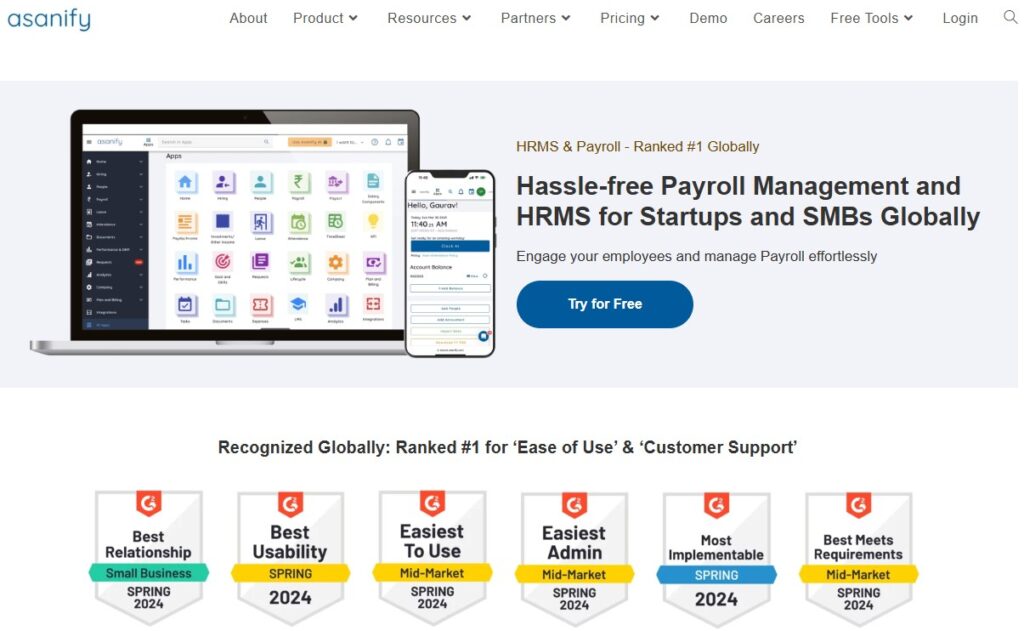
Localized Payroll Automation with PPh 21 and BPJS Compliance
Asanify is suitable for international employers venturing into Indonesia as well as local companies. Asanify automates PPh 21 income tax, BPJS Kesehatan & Ketenagakerjaan contributions, THR allowance, and severance regulations, making companies compliant with labor laws.
Salary Disbursement and Payslip Generation
Through direct bank connections, Asanify facilitates one-click salary payment and issues digital payslips to employees. Payroll reports and audit-ready statements help finance and HR teams stay on the same page.
All-in-One Payroll and HR Management with EOR Capability
Asanify stands out for its Employer of Record (EOR) solution that allows multinational companies to employ and remunerate employees in Indonesia without having a local entity. It also provides onboarding, document gathering (e-KTP, NPWP), leave management, and performance management, making it an end-to-end HR suite.
Best For: SMEs, start-ups, and multinational companies employing in Indonesia
UI: English + localized compliance templates
Pricing: Subscription-based with modular HR & EOR add-ons

Talenta by Mekari
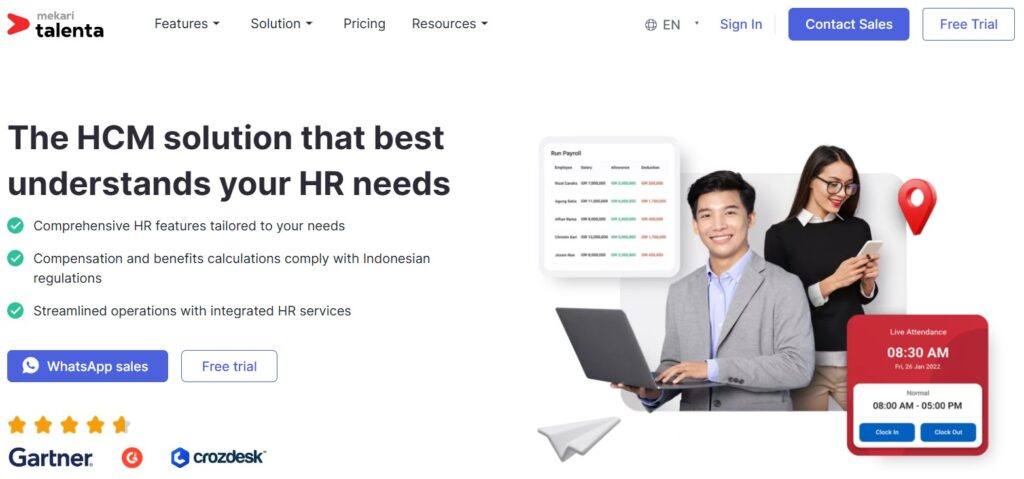
Talenta is among the most well-known payroll platforms in Indonesia. It accommodates PPh 21 tax automation, BPJS integration, management of e-KTP/NPWP data, and offers a Bahasa Indonesia UI. Its mobile application allows payroll to be accessed by employees to view payslips and request leaves.
Best For: SMEs to mid-market companies in Indonesia
UI: Bahasa Indonesia + English
Pricing: Tiered plans depending on features and number of employees
Sleekr
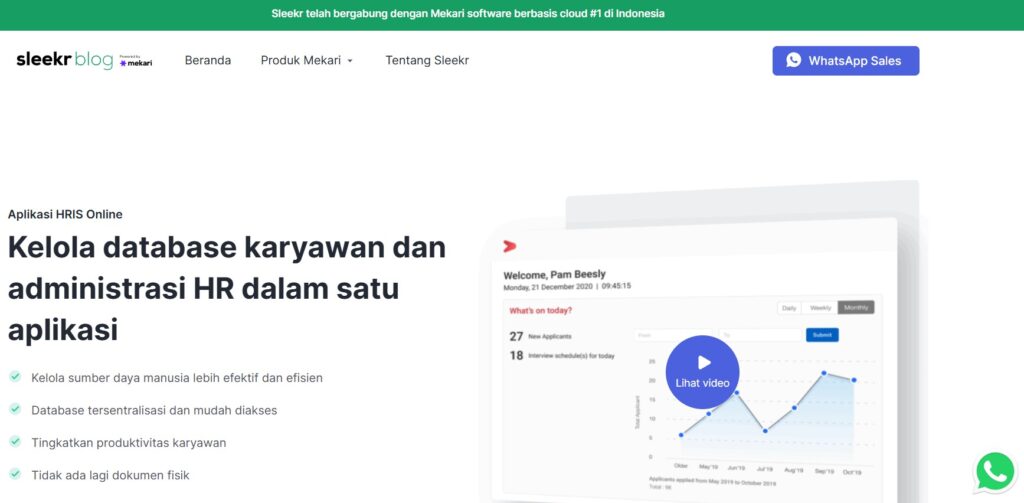
Now part of Mekari’s ecosystem, Sleekr is designed for startups and small businesses. It offers core payroll processing, PPh 21 compliance, and employee self-service portals at an affordable price point. Its modular setup allows companies to start with payroll and add HR features as they grow.
Best For: Startups and small businesses
UI: Bahasa Indonesia
Pricing: Budget-friendly subscription model
KaryaOne
KaryaOne integrates payroll with HR and leave. It has compliance support for PPh 21, BPJS, and THR, and an employee self-service portal. Its integration with attendance systems makes it popular for field or shift worker companies.
Best For: Growing teams in SMEs
UI: Bahasa Indonesia
Pricing: Scalable per-employee pricing
Gadjian
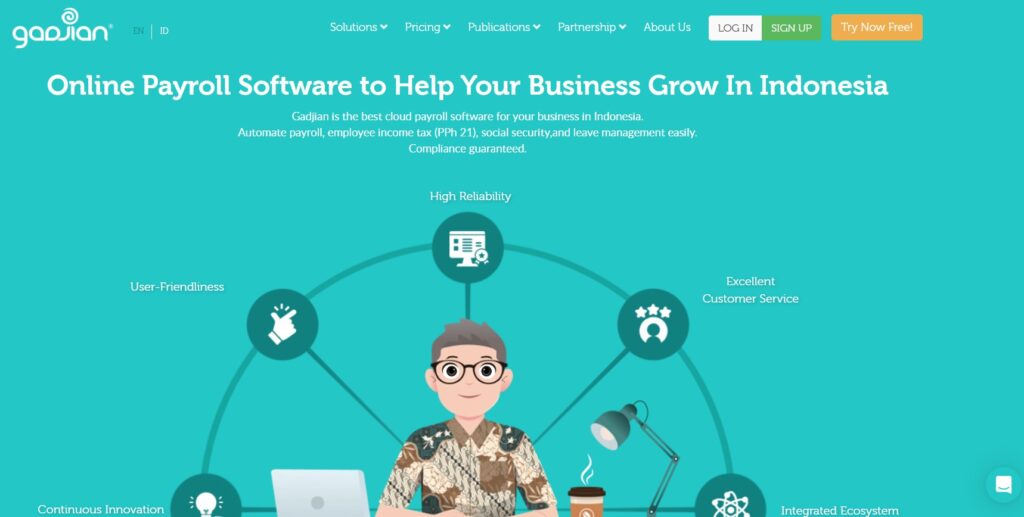
Referring to itself as a compliance-oriented payroll solution, Gadjian streamlines statutory payroll calculation such as BPJS, PPh 21, and THR. It also produces report-ready submissions to government authorities, making it of great appeal to companies that are risk-averse when it comes to compliance.
Best For: SMEs requiring accuracy and compliance
UI: Bahasa Indonesia
Pricing: Pay-per-employee monthly fee
GreatDay HR
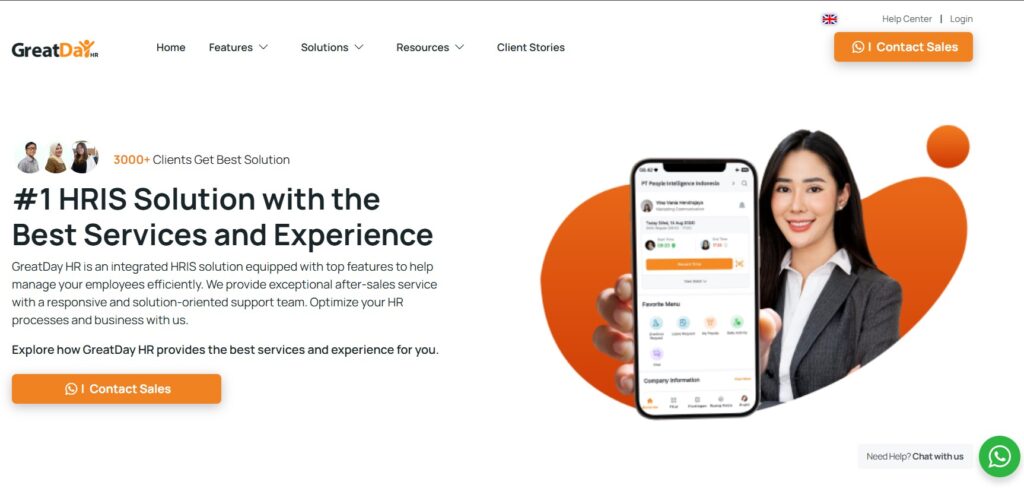
Previously SunFish HR, GreatDay HR provides a mobile-first payroll and HR experience. Employees can onboard, mark attendance, and see payslips from their smartphones. It’s particularly well-suited for organizations with distributed or remote teams.
Best For: Field teams or remote employees
UI: Bahasa Indonesia + English
Pricing: Flexible SaaS subscription
Zoho Payroll (Indonesia Edition)
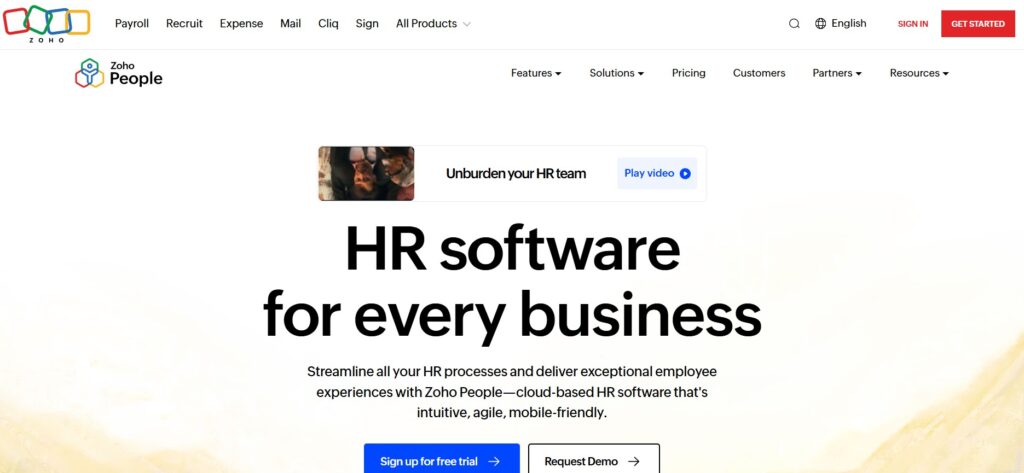
Zoho Payroll, one of the global Zoho suites, has made its Indonesia version customized for PPh 21, BPJS, and statutory compliance. It allows customizable salary structures, is integrated with accounting solutions such as Zoho Books, and features employee self-service portals.
Best For: SMEs and mid-size firms with regional/global operations
UI: English + compliance features localized
Pricing: Reasonable subscription, bundled with Zoho ecosystem
How to Choose the Right Payroll Software in Indonesia
- Understand your company size & workforce – SMEs may need simple, affordable tools, while larger firms often require multi-branch and advanced compliance features.
- Check payroll complexity – Make sure the software can handle bonuses, allowances, freelancers, and contracts if needed.
- Ensure local compliance – Look for automation of BPJS, PPh 21, THR, and severance to avoid errors and penalties.
- Look for Bahasa support – A localized UI and payslips in Bahasa improve adoption across teams.
- Compare pricing & support – Evaluate subscription vs. custom plans, and prioritize vendors with reliable local customer service.
Feature & Pricing Comparison Table
| Software | PPh 21 Support | BPJS Integration | Bahasa UI | Mobile Access | Best For | Pricing Model |
| Asanify | Yes | Yes | Yes | Yes | SMEs, Global | Subscription-based |
| Talenta | Yes | Yes | Yes | Yes | SMEs | Tiered Plans |
| Sleekr | Yes | Yes | Yes | Yes | Startups | Affordable |
| KaryaOne | Yes | Yes | Yes | Yes | Local SMEs | Custom |
| Gadjian | Yes | Yes | Yes | No | SMEs | Fixed Monthly Rates |
| GreatDay HR | Yes | Yes | Yes | Yes | Mobile Teams | App-based Plans |
| Zoho Payroll | Yes | Limited | Partial | Yes | MNCs | Global SaaS Pricing |

Future of Payroll Software in Indonesia (2025 and Beyond)
Payroll in Indonesia is rapidly changing. AI and machine-learning applications in pay systems can check the correctness of payroll calculations and raise alerts if anomalies are detected. In the near future, real-time integration with DJP and BPJS systems will also be expected, thus relieving the pressure of manual updating. As the gig economy grows, payroll tools will be forced to adapt to processing payments for freelancers and contractors alongside full-time employees.
Other features like on-demand payroll and instant pay are gaining traction too, allowing employees to draw on their earnings before the standard payday. Following the rise of remote working culture, mobile-first payroll applications are going to be commercially available for both HR teams and employees, giving them app-style convenience anytime and anywhere. Also, compliance dashboards and e-KTP integrations are aimed at ensuring transparency and security of payroll operations.
Streamline Your Payroll Workflow with Asanify’s Localized Solution
Asanify was established to ease payroll processing for the Indonesian payroll system while also assisting global employers with the EOR engagement scheme. Complicated tasks such as PPh 21 or BPJS contribution calculations are automatically handled by the platform with due consideration to compliance, so this does not need to be done manually. Employers are able to set the local rules for THR, severance, and overtime. Payslips are issued digitally in Bahasa Indonesia, and the employees can access these through a mobile-friendly dashboard.
Its ability to adapt to changes distinguishes Asanify trumps all other services. Maybe you need an intelligible and compliant solution as a local SME, or perhaps you are a multinational corporation trying to break into Indonesia; Asanify can provide you with flexibility and a focus on compliance. Integrated HR and payroll workflows allow your business to focus less on administrative headaches and more on growing.
Suggested Read: Best HR Onboarding Software in Indonesia to Streamline Your Hiring in 2025
Conclusion
Payroll in Indonesia is complicated. But, if you do have the right software, it is easy. When you go for a solution that automates compliance, scales to your company size, and supports employees in their local language, you can save time, diminish risk, and increase satisfaction.
From here, you should narrow down the choices to two or three respective providers and then run tests through the demos available and compare them based on your actual needs and set budget. In that respect, if you wish to have a compliance-first, Indonesia-ready payroll, Asanify is an option that you can count on for both reliability and scalability.
Frequently Asked Questions
SMBs pay monthly fees with setup costs; enterprises pay more. Many platforms offer free trials or modular pricing.
Yes. Tools like Asanify, Talenta, and Gadjian handle these automatically.
Yes. Almost all leading payroll tools offer Bahasa interfaces. This is important for smooth HR adoption and ensuring employees can access payslips, tax forms, and leave records without language barriers.
Yes. Many providers such as GreatDay HR, Asanify, and Talenta have mobile apps. These allow employees to view payslips, apply for leave, and update personal details directly from their phones.
Implementation time depends on company size and complexity. For SMBs, setup usually takes 1–3 weeks. Larger enterprises may take 1–2 months due to configuration, data migration, and employee training.
Yes. Most solutions support a mix of full-time, part-time, contractual staff, interns, and consultants. This flexibility helps businesses streamline payroll across diverse workforce structures.
Yes. Many payroll tools allow secure uploading and storage of employee documents such as e-KTP, NPWP, and tax forms. This feature makes audits and compliance checks easier.
Yes. Some platforms maintain local Indonesian support teams or provide Bahasa-speaking customer service agents. This ensures timely assistance for HR and finance teams.
Not to be considered as tax, legal, financial or HR advice. Regulations change over time so please consult a lawyer, accountant or Labour Law expert for specific guidance.

